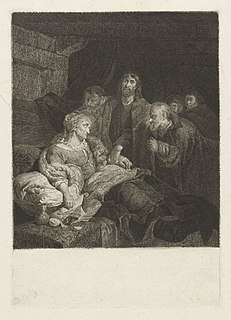Related Research Articles

John the Baptist was a Jewish itinerant preacher in the early 1st century AD. Other titles for John include John the Forerunner in Eastern Christianity, John the Immerser in some Baptist traditions, and the prophet John (Yaḥyā) in Islam. He is sometimes alternatively called John the Baptizer.

James the Just, or a variation of James, brother of the Lord, was a brother of Jesus, according to the New Testament. He was an early leader of the Jerusalem Church of the Apostolic Age. He died as a martyr in AD 62 or 69.

Matthew 1:25 is the twenty-fifth and last verse of the first chapter of the Gospel of Matthew in the New Testament. Joseph has awakened from a dream in which an angel gave him instructions about the birth of Jesus. He has taken Mary into his home, completing their marriage, and this verse explains what occurs once the couple is united.

Matthew 2:23 is the twenty-third verse of the second chapter of the Gospel of Matthew in the New Testament. The young Jesus and the Holy Family have just returned from Egypt and in this verse are said to settle in Nazareth. This is the final verse of Matthew's infancy narrative.

Mark 10 is the tenth chapter of the Gospel of Mark in the New Testament of the Christian Bible. It presents further teachings of Jesus as his journey progresses towards Jerusalem.

The Parable of the Sower is a parable of Jesus found in Matthew 13:1–23, Mark 4:1–20, Luke 8:4–15 and the extra-canonical Gospel of Thomas.
Matthew 15:21 is a verse in the fifteenth chapter of the Gospel of Matthew in the New Testament.
Matthew 9:10 is a verse in the ninth chapter of the Gospel of Matthew in the New Testament.
Matthew 8:9 is the ninth verse of the eighth chapter of the Gospel of Matthew in the New Testament. This verse continues the miracle story of healing the centurion's servant, the second of a series of miracles in Matthew.

Matthew 10:5 is the fifth verse in the ninth chapter of the Gospel of Matthew in the New Testament.
Matthew 9:20 is a verse in the ninth chapter of the Gospel of Matthew in the New Testament.
Matthew 9:22 is a verse in the ninth chapter of the Gospel of Matthew in the New Testament.

Matthew 8:14 is the fourteenth verse of the eighth chapter of the Gospel of Matthew in the New Testament. This verse describes the start of Jesus healing Peter's mother-in-law.
Matthew 14:12 is the twelfth verse in the fourteenth chapter of the Gospel of Matthew in the New Testament.
Matthew 14:23 is a verse in the fourteenth chapter of the Gospel of Matthew in the New Testament.

In the theological debate about Christianity and women, 'Jesus' relationships with women" are a significant factor. Women play an important role in the Christ Jesus story. He had numerous interactions with women and was first seen by women after his resurrection. He was born of a woman, had numerous interactions with women, and was first seen by women after his resurrection. He gave the women the task of informing his followers that he had risen from the dead, which is the central message of Christianity.
Binding and loosing is originally a Jewish Mishnaic phrase also mentioned in the New Testament, as well as in the Targum. In usage, to bind and to loose simply means to forbid by an indisputable authority and to permit by an indisputable authority. One example of this is Isaiah 58:5–6 which relates proper fasting to loosing the chains of injustice.

The Exorcism of the Syrophoenician woman's daughter is one of the miracles of Jesus in the Gospels and is recounted in the Gospel of Mark in Chapter 7 and in the Gospel of Matthew in Chapter 15. In Matthew, the story is recounted as the healing of a Greek woman's daughter. According to both accounts, Jesus exorcised the woman's daughter whilst travelling in the region of Tyre and Sidon, on account of the faith shown by the woman.

The Denial of Peter refers to three acts of denial of Jesus by the Apostle Peter as described in all four Gospels of the New Testament.
Matthew 14:15-21 is a set of verses in the fourteenth chapter of the Gospel of Matthew in the New Testament.
References
- ↑ Robert Witham, Annotations on the New Testament of Jesus Christ. Dublin: 1730.
- ↑ John MacEvilly, An Exposition of the Gospel of St. John consisting of an analysis of each chapter and of a Commentary critical, exegetical, doctrinal and moral, Dublin Gill & Son 1879.
- 1 2 3 4 5 "Catena Aurea: commentary on the four Gospels; collected out of the works of the Fathers. Oxford: Parker, 1874. Thomas Aquinas".
 This article incorporates text from this source, which is in the public domain.
This article incorporates text from this source, which is in the public domain.